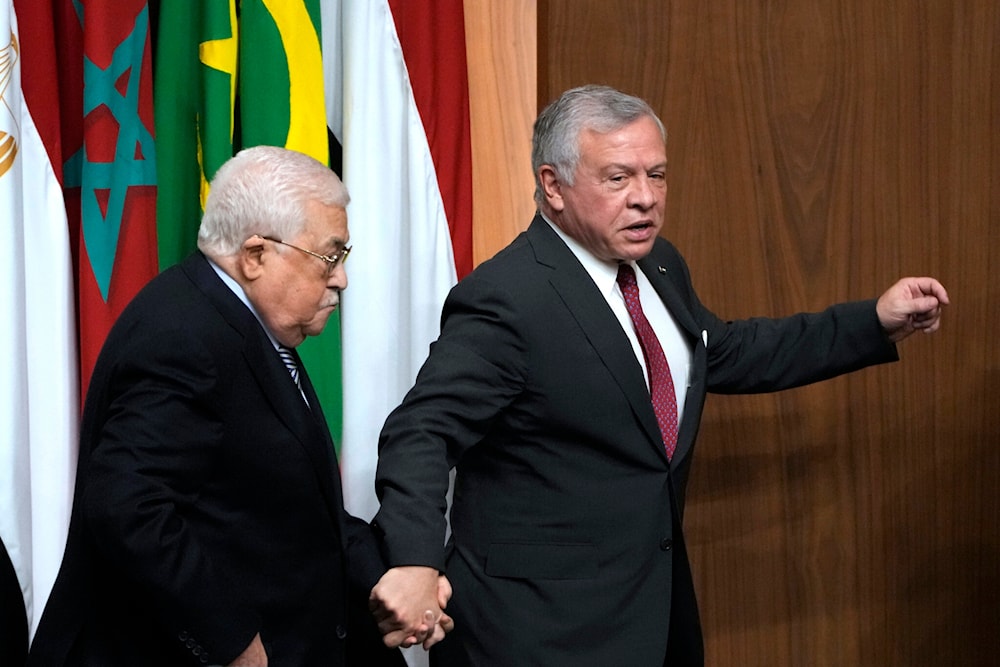Hamas regrets Abbas' remarks which blamed Resistance at Arab Summit
Before the start of the war, Abbas reportedly agreed to Saudi Arabia normalizing diplomatic relations with "Israel."
-

Palestinian Authority President Mahmoud Abbas, left, is accompanied by King Abdullah II of Jordan, during a conference at the Arab League headquarters in Cairo, Egypt, Sunday, Feb. 12, 2023 (AP Photo/Amr Nabil)
Hamas on Thursday expressed regret regarding remarks made by Palestinian Authority President Mahmoud Abbas during an Arab summit held in Manama.
"We express our regret regarding the remarks made by the president of the Palestinian Authority... at the Arab summit held in Manama," Hamas said in a statement, urging all "brotherly Arab states to take the necessary measures to compel the (Israeli) occupation to stop its aggression."
During the Summit, the PA's leader blamed the Resistance operation on October 7 providing "Israel" with an excuse to launch a genocide against the already besieged strip. He accused Hamas of providing "Israel" with pretexts to wage a war in Gaza.
Before the start of the war, Abbas reportedly agreed to Saudi Arabia normalizing diplomatic relations with "Israel." This agreement was supposed to occur without recognition of Palestinian statehood.
Read more: Top US, PA envoys to meet in Saudi Arabia... What's on the Horizon?
Declaration of the Arab Summit
At the end of the Summit, Arab heads of state meeting in Bahrain called for an "immediate and permanent ceasefire" in the Strip and for the UN to deploy peacekeepers in the occupied territories until a two-state solution is achieved.
The Arab League also called for the withdrawal of all Israeli forces from the Strip and the lifting of the blockade to facilitate the entry of humanitarian aid.
The League further reaffirmed its commitment to maritime navigation freedom and condemned "threats to commercial ships" in the Red Sea amid the Yemeni Resistance operation against Israeli shipping.
"[We] reaffirm our adherence to the freedom of maritime navigation in international waters … and to guarantee freedom of navigation in the Red Sea, the Arabian Sea, the Gulf of Oman and the Arabian Gulf, and strongly condemn the threats to commercial shipping," the declaration read.
This occurs amid heightened tensions between the Yemeni resistance's blockade on the Israeli regime and the US-UK naval coalition aimed at dismantling the Yemeni blockade. Yemen has justified its blockade on "Israel" on the basis that the regime is orchestrating a genocide in the Strip.
Read more: Yemen to expand naval operations beyond Mediterranean, al-Houthi says
UN Spokesman Clarifies Conditions for UN Peacekeeper Deployment
Responding to calls for UN peacekeepers in Gaza, UN spokesman Farhan Haq said that the deployment of peacekeeping missions depends on Security Council mandates and conditions on the ground. He further stressed the need for acceptance by involved parties and proper conditions for UN presence.
"Creating peacekeeping missions depends on a variety of things. One of them… is a mandate from the Security Council," Haq said. "Then of course, there need to be conditions on the ground including acceptance by the parties of a UN presence, and that too is something that would need to be established."

 3 Min Read
3 Min Read










